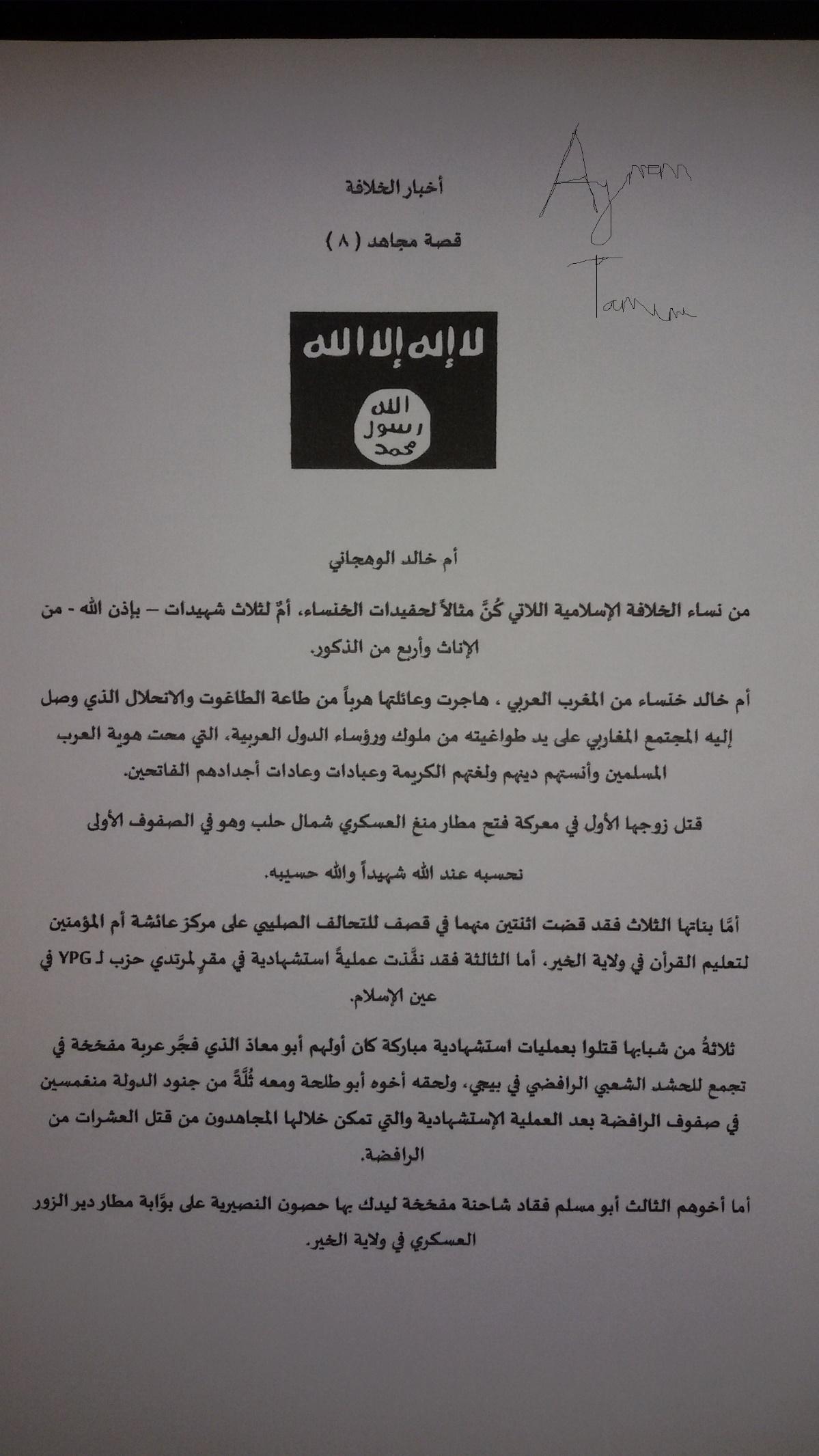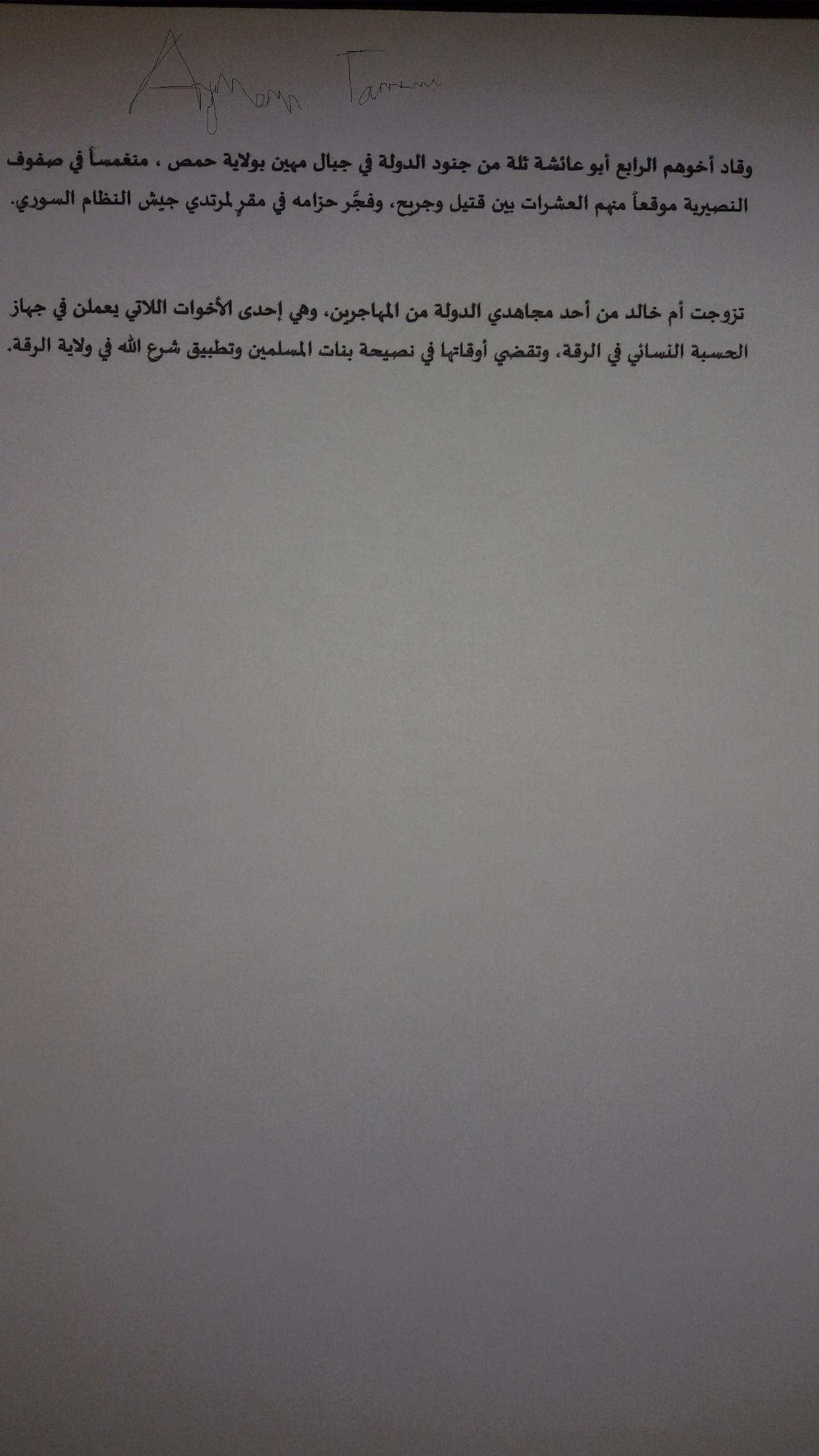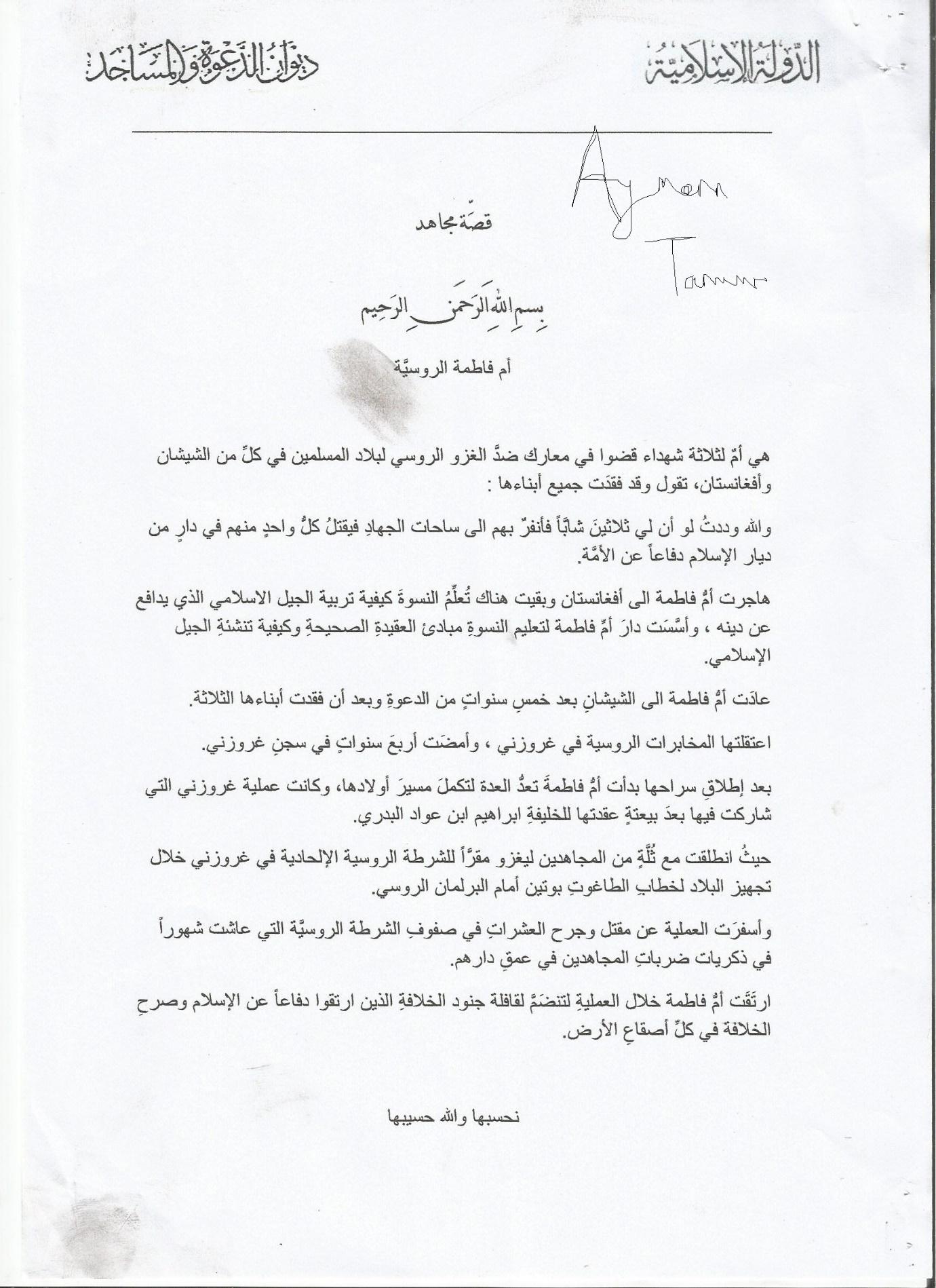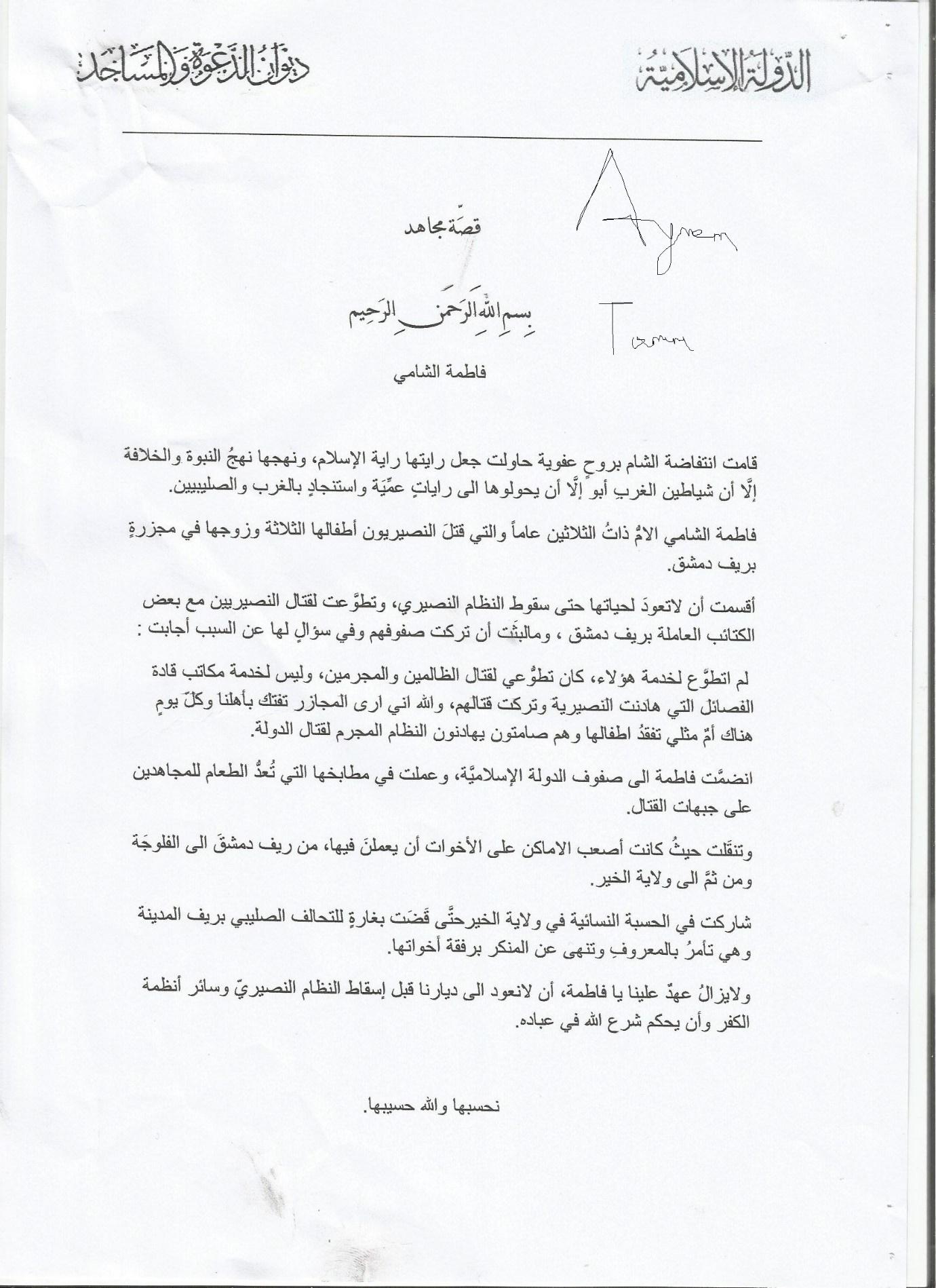NOTE: For prior parts in The Archivist series you can view an archive of it all here. And for his older series see: Musings of an Iraqi Brasenostril on Jihad.
—
Stories of the Mujahideen: Women of the Islamic State
By Aymenn al-Tamimi
The previous post in The Archivist series looked at the internally distributed series of documents entitled Qisas al-Mujahideen (‘Stories of the Mujahideen’), which tell stories of particular individuals in the Islamic State (IS). One of the figures covered in these series was Dr. Iman Mustafa al-Bagha, a Syrian female Islamic scholar who has worked in IS’ Diwan al-Iftaa’ wa al-Buhuth (‘Fatwa Issuing and Research Department’) and organization of women’s hisba (Islamic morality enforcement) teams in the various provinces of IS. Her activities were characterized as jihad, with the biography of her emphasizing that she was continuing in this jihad despite the loss of her son Abu al-Hassan al-Dimashqi.
This post looks further at the women covered in Qisas al-Mujahideen. These particular stories point to roles beyond hisba and Islamic jurisprudence. Indeed, IS even appears to allow for an actual military role for women, as mention is made of a female suicide bomber who targeted a Kurdish YPG base in the Kobani area (in IS discourse: Ayn al-Islam). Female suicide bombers are not publicised in IS’ official propaganda, where certain suicide bombing operations are publicised with the name of the suicide bomber in the form of a kunya and sometimes a photo of the bomber. Perhaps one reason female suicide bombers are not publicised is that it is not possible, by IS standards on women’s modesty, to show their faces in the propaganda.
In the context of military roles, a particular case of interest here is that of Umm Fatima al-Rusiya, who is said to have participated in an operation in Grozny after giving her allegiance to IS leader Abu Bakr al-Baghdadi. The operation in question was actually claimed by the Caucasus Emirate. However, the operation also came at a time when North Caucasian jihadis and leaders began pledging allegiance to Baghdadi and going public with their pledges, thereby defecting from the Caucasus Emirate. Some, it seems, may have kept their pledges and/or IS sympathies private for a time in the hope that the Caucasus Emirate’s overall leader at the time, who was subsequently killed in April 2015, would declare allegiance to IS. Ultimately he did not do so.
Also of note in the internal documents here is the role women can play in providing food for fighters. Indeed, every IS brigade (liwa) is supposed to have a team of cooks and kitchen staff that constitute the matbakh (‘kitchen’) for the IS brigade. For a sample food schedule for an IS battalion (katiba, which on the basis of documentary evidence appears to be a subordinate part of a liwa), see Specimen 18U in my archives of IS documents.
Unsupported by the evidence, in contrast, is any notion of ‘sex jihad’ (jihad al-nikah). Some have attempted to draw attention to internal IS documents under the title of aqd nikah as proof of institutionalised ‘sex jihad’. In fact, these documents are no more than simple marriage contracts.
Below are the documents with translation, including parenthetical notes in square brackets for explanation of some terms.
Umm Khalid al-Wahjani (released under the series as part of Akhbar al-Khilafa)

Among the women who have been an example for the granddaughters of al-Khansa’: a mother of three martyrs- by God’s permission- from the girls and four martyrs from the boys.
Umm Khalid Khansa’ is from the Arab Maghreb, and migrated along with her family fleeing obedience to the taghut [idolatrous tyranny/tyrant] and the decay that Maghrebi society had attained at the hand of its tawagheet from the kings and heads of the Arab states, which have wiped out the identity of the Arab Muslims and made them forget their religion, noble language, and acts of worship and customs of their conquering ancestors.
Her first husband was killed in the battle of the conquest of Mennagh military airport north of Aleppo as he was in the first ranks, so we reckon him as a martyr with God and God is his reckoner.
As for her three daughters, two of them were killed in Crusader coalition bombing on the Aisha Umm al-Mu’mineen centre to teach the Qur’an in Wilayat al-Kheir. As for the third, she carried out a martyrdom operation in a base for the YPG party apostates in Ayn al-Islam.
Three of her sons were killed in blessed martyrdom operations, the first of whom was Abu Mu’adh who blew up a rigged vehicle in a gathering of the Rafidite [derogatory for Shi’i] Hashd Sha’abi in Baiji. Following him was his brother Abu Talha and with him a group of soldiers of the Dawla carrying out an inghimasi [commando] raid into the ranks of the Rafidites after the martyrdom operation, during which the mujahideen managed to kill dozens of the Rafidites.
As for their third brother Abu Muslim, he drove a truck rigged with explosives with which to strike the fortresses of the Nusayris at the gates of Deir az-Zor military airport in Wilayat al-Kheir.

And their fourth brother Abu A’isha led a group of the Dawla’s soldiers in the Mahin mountains in Wilayat Homs, launching an inghimasi raid into the ranks of the Nusayris, leaving dozens of them killed and wounded, and he blew up his belt in a base of the apostates of the Syrian regime army.
Umm Khalid married one of the mujahideen of the Dawla from the muhajireen, and she is one of the sisters who work in the women’s hisba apparatus in Raqqa, spending her time advising the daughters of the Muslims and applying God’s law in Wilayat al-Raqqa.
Umm Fatima al-Rusiya (released under the Diwan al-Da’wa wa al-Masajid)

She is the mother of three martyrs who died in battles against the Russian invasions of the land of the Muslims in all of Chechnya and Afghanistan. She says having lost all her sons:
‘By God I wish I had 30 sons, so I should have them go forth to the fields of jihad and every one of them should be killed in one of the lands of Islam defending the Ummah.’
Umm Fatima migrated to Afghanistan and remained there teaching women how to raise the Islamic generation that defends its religion, and she established Dar Umm Fatima to teach women the principles of true aqeeda [creed] and how to raise the Islamic generation.
Umm Fatima returned to Chechnya after five years of da’wa [proselytization] and after she lost her three sons. The Russian intelligence arrested her in Grozny, and she spent four years in Grozny prison. After being released, Umm Fatima began making preparations to fulfil the path of her children, and there was the Grozny operation in which she participated after pledging allegiance to the Caliph Ibrahim bin Awwad al-Badri, as she set out with a group of mujahideen to attack a base for the heretic Russian police in Grozny during the country’s preparation for a speech by the taghut Putin in front of the Russian parliament.
The operation led to the killing and wounding of dozens from the ranks of the Russian police that lived for months in recollections of the strikes of the mujahideen in the depth of their abode.
Umm Fatima died during the operation to join the convoy of soldiers of the Caliphate who died defending Islam and the structure of the Caliphate in all regions of the world.
Thus we reckon her and God is her reckoner.
Fatima al-Shami (released under the Diwan al-Da’wa wa al-Masajid)

The intifada of al-Sham arose with an instinctive spirit that tried to make its banner the banner of Islam, and its methodology that of the Prophetic methodology and the Caliphate. But the Satans of the West insisted on turning it to banners of ignorance [/blindness] and seeking help in the West and Crusaders.
Fatima al-Shami is a mother of a thirty year-old whose three children and husband were killed by the Nusayris in a massacre in the Damascus countryside.
She swore not to return to her life until the fall of the Nusayri regime, and she enlisted to fight the Nusayris with some of the battalions in Damascus countryside, but it did not take long before she left their ranks and in a question to her about the reason, she responded:
‘I did not enlist to serve these people: my enlistment was to fight the oppressors and criminals, and not to serve the offices of the leaders of the factions that have concluded truces with the Nusayris and abandoned fighting them. By God I see massacres afflicting our people and every day there is a mother like me losing her children, but they are silent and concluding truces with the criminal regime to fight the Dawla.’
Fatima joined the ranks of the Islamic State, and worked in its kitchens that prepare food for the mujahideen on the fighting fronts.
And she was transferred as they were the most difficult of places for the sisters to work in, from the Damascus countryside to Fallujah and after that to Wilayat al-Kheir.
She participated in the women’s hisba in Wilayat al-Kheir until she died in a Crusader coalition strike in the town’s countryside while she was commanding what is right and forbidding what is wrong, accompanied by her sisters.
And a pledge remains upon us oh Fatima, that we will not return to our abodes before bringing down the Nusayri regime and the rest of the systems of kufr, and that God’s law should rule among His servants.
Thus we reckon her and God is her reckoner.
The Archivist: Stories of the Mujahideen: Women of the Islamic State
Posted on

1 Reply to “The Archivist: Stories of the Mujahideen: Women of the Islamic State”
Comments are closed.